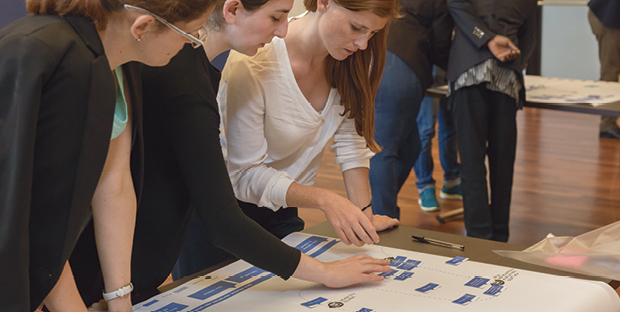
After interviewing field participants about their impressions of the Profiling Coordination Training (PCT), which was hosted by JIPS in July 2017 in Geneva, Switzerland, we also asked Miguel Serrano (OCHA) and Johanna Bohl (ICRC) how useful the Training was for them, from an institutional perspective.
As Miguel and Johanna explain, the Training is a substantial step towards participating in an exercise themselves, as they were definitely able to learn hands-on what each step of a profiling process entails. Discover their highlights and reflections below.



Miguel Serrano (Associate Humanitarian Affairs Officer, Coordinated Assessment Section, OCHA): I am working on coordinated assessments, so profiling is closely linked to what I am doing. All sessions were in fact very relevant to my work. The things I have learned here help me to provide better support to our country operations: for instance when they request guidance on how to conduct a coordinated assessment, or how to carry out a joint analysis exercise.
I found there was a good balance between presentations and practical exercises. Throughout the Training and especially the exercises, you promoted active participation from everyone, enhancing our learning experience. It was also helpful to go through the entire profiling cycle, including how to set up a profiling working group, or how to do the data analysis and the reporting.
Johanna Bohl (Associate Internal Displacement, ICRC): I am working on internal displacement, among other things, within the protection of civilians unit of the ICRC. As part of our strategy, we are currently working on ways to improve evidence-based responses to internal displacement, with a specific focus on urban settings. In this context, the Profiling Coordination Training has been greatly useful as I learned about different methodologies of identifying IDPs in urban areas, different techniques to do the analysis, or ways to collect sound and comprehensive data on which to build our response.
This will help us when looking at how to operationalise our strategy in urban settings, and I think that the training will also be useful when we look at how we can potentially work together with JIPS.
Miguel: At a professional level, my highlight is that I discovered profiling – it was a totally new world for me. I understand much better now what the difference is with a coordinated needs assessment. I don’t feel ready yet to coordinate a profiling exercise myself, but I know the basics and I can support much better profiling processes undertaken by our country operations.
At a personal level, I greatly appreciated the opportunity to meet new people working in different contexts, at headquarters level as well as in the field. I also found it useful to hear the different perspectives from colleagues coming from information management, protection, coordination, and more. I look forward to keeping in touch with them in the future.
Johanna: This is also my personal – and professional – highlight. We were able to exchange and discuss good practices, both during the sessions and outside, as well as do’s and don’ts. It shows me again why both data for protection and data protection are so important.
I found the most helpful day was when we looked at how to analyse the data that we collected and had very practical sessions on that. I love the case study [Freedonia] and think it was really helpful to work through each step of a profiling exercise.
Miguel: Another professional highlight for me was that throughout the Training we kept protection-related issues in mind. This allowed me to better understand what it entails, especially in humanitarian contexts.
Johanna: I agree, this was a really strong point: we made constant links between protection and information management, and this, I think, is important since they are so closely linked, and it seems that oftentimes you can only fully understand one with the other.

Miguel: For me personally it is the first time, although my section knows JIPS very well and has worked with you in various contexts.
Johanna: I attended the launch of the profiling reports from the Kurdistan Region of Iraq last year and met JIPS colleagues who had been involved in these exercises. This was very interesting for us, both in terms of the data collection methods used and the results. JIPS has also been contributing through their expertise to ICRC trainings, including the recent ‘Protection of civilian populations’ course, where a JIPS colleague shared experiences from the profiling exercises in Honduras and Hargeisa, Somalia. We would like to continue the collaboration at the institutional level.